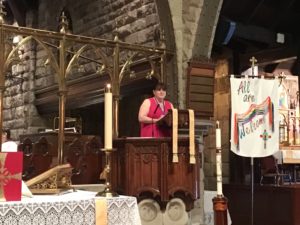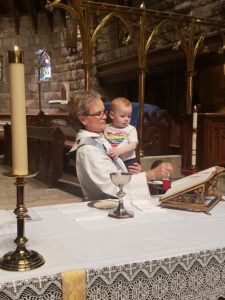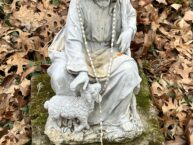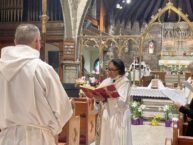 June 2, 2018: [Our guest preacher was Ms. Kelly Mcallister. Kelly is a second grade teacher at Golda Och Academy in West Orange. Her wife Amy is a Tax Attorney with Wilson Elsner in Florham Park, and a member of our Vestry. They have been attending Christ Church since 2014, initially with their children Aidan and Marian Hess, and now as a family of five with their son Henry, who attends our nursery school.]
June 2, 2018: [Our guest preacher was Ms. Kelly Mcallister. Kelly is a second grade teacher at Golda Och Academy in West Orange. Her wife Amy is a Tax Attorney with Wilson Elsner in Florham Park, and a member of our Vestry. They have been attending Christ Church since 2014, initially with their children Aidan and Marian Hess, and now as a family of five with their son Henry, who attends our nursery school.]
When Mother Diana asked my wife Amy and I to speak this week, our reactions were wildly different. Amy wanted nothing to do with it, while I was ready to go. I often joke that we are like Aaron Burr and Alexander Hamilton in this regard. Like Burr, Amy keeps things close to her chest, while I, like Hamilton, stand ready to speak on any subject at any time.
In truth, I would have agreed to speak today, even if I was not a talker, and I know in my absence, Amy would have done so as well. This is because we both recognize the importance of LGBTQ visibilty. It’s why we fly a rainbow flag all year long, and why we donate to organizations like the Trevor Project. I’m not being dramatic when I say that we must speak up, because children are dying.
Due to higher risk factors of discrimination, bullying, and isolation, LGBTQ youth are particularly vulnerable to a range of issues including anxiety, depression, and suicidal ideation. The Trevor Project recently posted a research brief outlining protective factors that can build resiliency in LGBTQ youth. The factors fall into four areas: Social Support, Role Models, Environment, and Coping. We often think of role models as the notable figures in our society, but the truth is, we are all role models. Any time we exist in the same space as youth, we are modeling how to navigate the world. Their eyes are always on us.
The need for ordinary LGBTQ role models is crucial. Young people need to see versions of themselves in the world. They need to see that there is a future for them. Sure, as idealistic kids we have dreams of being trailblazers, but the truth is, we’re all a lot more comfortable following at least a mildly beaten path.
I grew up as a teen in the 90s in a suburb just north of Atlanta, Georgia. My parents and most of my friends were not anti-gay, but the culture that surrounded me often was. In high school I saw a girl ridiculed and called a lesbian as she walked down the hall. I heard whispers about kids that were suspected to be gay, as though there was something shameful about it. Even as LGBTQ visibility increased with shows like Will and Grace and Ellen’s coming out, homosexuality was very clearly relegated to the status of “other.”
In a way I was lucky. From an early age, I felt a call to faith, marriage, and motherhood, and in the absence of a vision of that life as a gay person, I simply assumed I was heterosexual. I can’t imagine the agony I would have experienced had I spent years falsely assuming I could not have the life I envisioned. It was hard enough to realize as an adult that I had gotten it wrong, especially when it meant I had to leave the faith community I was a part of.
I am speaking today about my life with my wife Amy, for the same reason we stay active in our community and live openly. LGBTQ kids need to see that there is no “gay lifestyle.” There are simply millions of varied lifestyles that all humans, gay or straight live out each day. We are every bit your typical suburban, churchgoing family, that just happens to have two moms.
I did not realize I was gay until I was in my thirties. Looking back, there were signs, but I was blinded to them by the vision I had of my future. And of course, I did really fall in love with my first husband. We were high school sweethearts, who got married just after college. Together we made two beautiful children. Unfortunately we fell victim to the same affliction that hits many who marry young. Neither of us knew ourselves well enough to realize that we wanted different things out of life together. Our marriage was not destined to last, though I don’t regret it. Not just for my older children, but for the lessons I learned about myself and relationships.
And then, Amy. She was part of a larger group of friends I met during the worst time of my life. My mother battled a brain tumor for a year before it grew around her brain stem putting her on a ventilator, and forcing my father, brother, and I to make the devastating decision to put her in hospice care. My father, who battled severe depression most of his life, coped during her illness the only way he knew how, with alcohol. He died a month after my mother. On top of all of this, or perhaps because of it, I realized my marriage was not going to last.
During time, Amy was a friend, one of four that I turned to regularly. Our group text continues to this day, and though I don’t often tell them, they truly saved my life. Amy was just one of the four, until one night in Brooklyn. I had had a little too much to drink (maybe more than a little), and Amy put her arm around me to steady me as we sat on the subway. And in that moment, my world changed. I felt something I had never felt before. I didn’t say it, fearful that I was alone in the feeling. It was a month later that I discovered I wasn’t. Though it felt like forever at the time, in less than a year, Amy and I had rearranged our lives to be together. We were incredibly lucky to see marriage equality achieved in New Jersey and then the US not long after we knew we wanted to marry.
But it wasn’t easy. I lost friends and to be honest, I’m still not sure where I stand with some of my extended family, though I suspect it’s not the best place. Others did stand by me, and I’m grateful to know that even though my parents didn’t get to meet Amy, they would have loved her. God has given me peace in that knowledge.
One of the most difficult things for me was the loss of a church home. Obviously, moving to NJ from GA meant I’d need a new church, but having a relationship with a woman meant much more than that. I was Catholic in the tradition of my mother’s family. I have always loved the Catholic church. I was drawn to the tradition and beauty of the mass as a child, and I was heartbroken to know that my place in the church was lost. Yes, there are Catholic communities that would allow me to attend, even with my wife. And sure, some priests would even turn a blind eye and allow me to continue to take communion. But tolerance is not the same as acceptance, and acceptance is not the same as affirmation.
At first, I was ready to try finding a place in a local Catholic church. Some of our dearest local friends, those we consider family, are Catholic, and I know they would have welcomed us next to them. Thankfully, my wife knew this wouldn’t be enough. She knew we needed a faith home that would fully embrace our family. Though my friends and others in their church might embrace us, the Catholic church is still bound by a hierarchy that would not bless our union. My wife knew I would need that.
I started looking around the internet for churches. Thankfully there are resources for LGBTQ people of faith, and living in such a populated and progressive area, we had options. Christ Church was close and looked like it might fit the bill, so we came in. We never even visited another church. I was happy to find the tradition and beauty I needed, and Amy was happy to find a church where questions and progressive thought are welcome. We truly have the best of both worlds.
Fast forward to today, where we live in a nearby neighborhood with our two big kids and the baby. Aidan and Marian are now preteens who roll their eyes and say they don’t want to go to church, just like all kids their age. Henry was

Henry with Mtr. Diana, helping at the Eucharist for the Joyful Noise! service.
baptized in our church just like any other baby, and when we get around to it, Amy and I will add to our civil marriage vows with religious ones. Amy serves on the vestry, and I chaired a discernment committee. We rush to try and get our family to church on time, and most weeks we fail, just like lots of other families with kids.
The point of all of this is that I want LGBTQ people, especially young people, to know that you too can have a boring suburban family. Or you can be single and party. Or get married and not have kids. You can find a faith community or not. You can stay in a church that does not affirm who you are and work to make it better, or you can realize that you need to be in a church that affirms you now. It doesn’t matter what you picture in your future, you can have it. Whether you’re discovering who you are at 15, 30, or 50, your future is wide open.
I kid of course, about having a boring family. We’re not perfect. We argue, there’s a lot of diapers, and everything is covered in cat and dog hair. I wish there were more family game nights and less tv show marathoning. My life is messy, but it’s beautiful. There are moments when I look at my wife and children, and I’m overcome by how right this life is. I know in my heart that my family, my marriage, and my life are blessed and loved by God.
I have faith that the world is moving toward what I already know. That someday LGBTQ youth will not face the struggles they do now. That LGBTQ folks, especially our Transgender and Non-binary people will not be at greater risk of violence. That everyone, regardless of sexual orientation or gender expression will be able to find a faith home if they want it. But for now, Amy and I live our life together to show everyone that being gay and being faithful are not mutually exclusive, and that every family and every person are deserving of God’s love and our compassion.
Amen.
For the audio from the 10:30am service, click below, or subscribe to our iTunes Sermon Podcast by clicking here:






